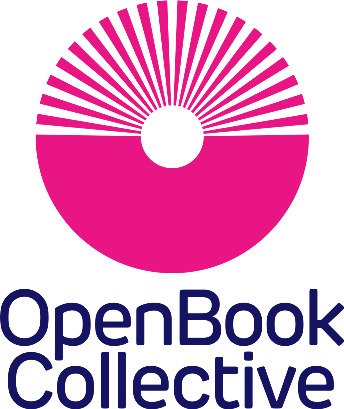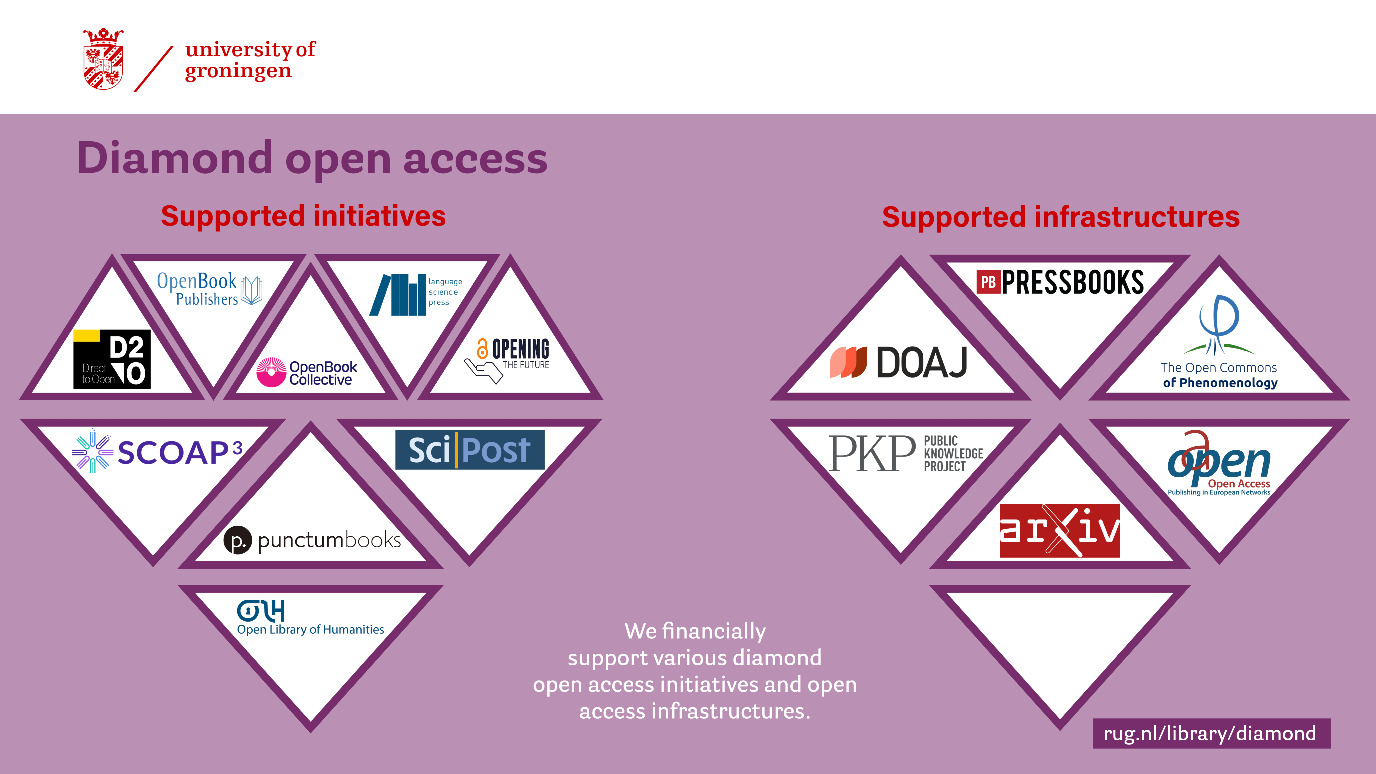Striving for a more equitable and diverse book publishing ecosystem: UG supports Open Book Collective
| Date: | 07 October 2024 |
| Author: | Giulia Trentacosti |

In August 2024, the University of Groningen Library became a sponsoring member of the Open Book Collective (OBC). The OBC is a UK-registered charity that enables libraries and other knowledge institutions to collectively support open access book publishers and service providers.
The OBC is committed to shaping a more equitable, collaborative and bibliodiverse academic book publishing system. It allows members to evaluate, compare, and support a range of small-to-medium open access book publishers, as well as service and infrastructure providers. This financing model enables publishers to move away from Book Processing Charges. It is a community-led, accountable organization. Furthermore, the OBC is set-up in such a way that members receiving income from supporters will give back to the OBC a portion of the revenue they receive to a collective development fund. This fund is used to help smaller initiatives through the development of toolkits, webinars, and other education materials, and mini-grants.
We talked to Kevin Sanders, Open Access Engagement Lead at the Open Book Collective, about the ambitions of the OBC, and the role libraries play in the transition to a more sustainable publishing ecosystem.
As a librarian, I want an even more diverse range of librarians working together with the Open Book Collective to foster a more holistic culture for publishing and disseminating work.
What’s your assessment of the current status of academic publishing in general and of academic book publishing in particular?
This is a great starter question! Academic book publishing is currently in somewhat of a state of flux. Following major changes in academic publishing with the emergence of digital dissemination, various dynamics have shifted in both the publishing and academic worlds, and this is particularly impacting scholarly books now that open access has really established itself. Certain legacy publishing practices, such as licensing and copyright transfer, have certainly come under the spotlight as open access books have become desirable to enhance access, usage, and the wider dissemination of scholarly books.
Simultaneously, developing vital revenue models that can sustain publishers and service providers is a particular challenge in this regard. The roll-out of the book processing charges (BPC) model was almost inevitable, but these charges lack transparency around their construction and fundamentally reproduce unjustified hierarchies, where only authors with access to research funds or wealthy institutions with budgets to cover the discrete costs of per-book publication.
How does the OBC situate itself within this landscape?
At the Open Book Collective, we have tried to expand the pioneering library partnership schemes of born open access publishers such as Open Book Publishers, punctum books, and the OAPEN Foundation to create library partnerships that enable libraries to invest in our publishers and service providers. Unlike the BPC model, this is not simply the library purchasing a service or good from a publisher, but rather the library becoming part of Open Book Collective’s community-led governance, giving them political agency within the open access book publishing space that we are supporting.
The libraries that support the Open Book Collective have enabled more publishers and service providers to join us and benefit from this model, proving the scaling small model can scale out rather than up and further diversify the Diamond open access landscape as a community-led endeavour.
What are your hopes and dreams for the future of the Open Book Collective in, let’s say, 10 years time?
Our aspirations are modest but significant. As a registered charity working with predominantly (but not exclusively) non-profit organisations, we are not looking to ‘dominate the market’ or any subset thereof, but rather we are looking to ensure that a more equitable and bibliodiverse diamond open access landscape can be financially sustainable and flourish into the future. Given the economic challenges that research organisations and scholarly libraries are facing, this is a real challenge. However, by working together, we can share information and ideas to ensure that this future becomes a reality.
As an academic library we care deeply about supporting community-led, fair OA initiatives like the OBC. Indeed , we have to deal with shrinking budgets, as well as academia’s never-ending dependance on commercial publishers which restricts our ability to invest in sustainable OA models. What’s your suggestion to address this conundrum?
As an academic librarian who has worked at a number of universities across the UK, this is a problem that I am very familiar with, and it is not an easy one to ‘fix’! However, I think we can start by looking at what strategies are already in place at universities and within library strategies and see how we can support such agendas through supporting initiatives like the Open Book Collective, Opening the Future, etc.
Institutional strategies will commonly make references to ‘increasing openness’ or a need to ‘collaborate with partners that share our values’, and libraries may well want to widen participation by making resources available in perpetuity. Well, supporting diamond open access publishers hits all the marks straight away; the books will be available to anyone with internet access in perpetuity under open licences allowing greater re-use, rights, all at a reasonable price because there surplus or profit is not a major proportion of the price, unlike with large, commercial publishers and services that dominate the market and library resource budgets.
Libraries also have the opportunity to recommend and encourage the use of open access resources on reading lists. There are many benefits for students in this, as the resources will be available to them in perpetuity. Some of our publishers also produce textbooks and open educational resources (OERs) and these can expand the capacity for readers to access vital teaching resources.
The professional ethics of librarianship are complex and sometimes conflicting. However, I think that the sector is radically changing. The move away from poor research assessment practices predicated on inappropriate metrics and towards responsible research assessment is a key indicator of this. The creation of budgets to support a more fair, more bibliodiverse, and more equitable publication system is viable for libraries as they proportionately reduce spend on proprietary and paywalled scholarly content, and even on the unsustainable and opaque processing charges that have become synonymous with gold open access. We can work with libraries that are interested in supporting us and share information on how some library members are successfully doing this as we did at our LIBER 2024 pre-conference workshop.
How do you see the role of university libraries evolving in response to initiatives like the Open Book Collective?
The fact that librarians become Custodians of the Open Book Collective and can have voting rights and so forth shows that libraries are not consumers of the Open Book Collective, and that it really is a partnership. We have a robust governance model to ensure that we cannot be acquired by commercial organisations, and our charity registration not only supports that, but also gives u us charitable responsibilities.
As a librarian, I want an even more diverse range of librarians working together with the Open Book Collective to foster a more holistic culture for publishing and disseminating work. Beyond this, our service provider members are developing free and open source software and tools that librarians can make use of in various ways, from publishing, to evaluating the books that are being published across the Open Book Collective.
Do you think open book initiatives can replace commercial academic book publication?
No. We’re not competing with commercial publishers and services. We are trying to foster a variant form of scholarly publishing that is community rather than commercially led. My only minor frustration here is the openwashing and community-washing that we are starting to see in this space. By this, I mean that the language and philosophies espoused by diamond open access publishers and open source developers are being misappropriated by commercial organisations. The Copim community is currently preparing an article around this, and it is something that I would encourage libraries to watch out for and to evaluate the usage of such terms in context.
In a competitive academic environment, where the prestige that comes with publishing with legacy publishers is still very important, how do we as libraries best promote community-led, smaller presses like the ones that are part of the OBC?
Again, this is a fantastic question to end on! Prestige is a complex area. The prestige economy is regressive and incompatible with the liberatory ethics that I believe our approach to diamond open access offers, and also to the emerging responsible research assessment that CoARA are taking a central role in. However, many of our publishers have developed a positive reputation over time. This is deserved and another form of prestige. However this prestige isn’t being used to control even the niches of the scholarly book markets that our publishers work in. And everyone has access to the fruits of their prestige!



